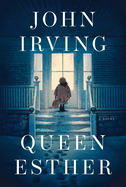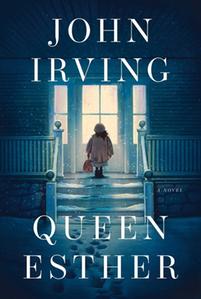
 For anyone who's followed John Irving's nearly six-decades-long literary career, settling into another of his novels feels like stepping into a beloved pair of slippers. But, as he demonstrates in Queen Esther, that sense of homecoming shouldn't distract readers from the insight and empathy that have consistently characterized his work, including this tenderhearted bildungsroman about a writer whose life, not surprisingly, bears some similarity to Irving's own.
For anyone who's followed John Irving's nearly six-decades-long literary career, settling into another of his novels feels like stepping into a beloved pair of slippers. But, as he demonstrates in Queen Esther, that sense of homecoming shouldn't distract readers from the insight and empathy that have consistently characterized his work, including this tenderhearted bildungsroman about a writer whose life, not surprisingly, bears some similarity to Irving's own.
Irving's previous novel, The Last Chairlift, clocked in at more than 900 pages, and though Queen Esther doesn't make it to even half that length, there's no shortage of engaging characters and complications to keep the plot pulsing along. In what's clearly a homage in both substance and style to Charles Dickens's Great Expectations, it tells the story of Jimmy Winslow, whose grandfather Thomas teaches English at Pennacook Academy, a New Hampshire boys' prep school, and who's instilled in his grandson a love of the Victorian novel.
Jimmy's story is intertwined with that of Esther Nacht, who is Jewish and was born in Vienna in 1905. She emigrates with her parents at age three, but after her father dies in transit and her mother is murdered in Portland, Maine, she's abducted and taken to an orphanage operated by Dr. Wilbur Larch (whom readers might recognize from Irving's 1985 novel The Cider House Rules). As a teenager, Esther is brought into Jimmy's grandparent's household to serve as an au pair for the daughter they're expecting.
Irving (Avenue of Mysteries), who has tackled the issue of bigotry against sexual minorities in novels like The World According to Garp and In One Person, turns his attention here to antisemitism. It manifests in the genteel-seeming bigotry of Pennacook's townspeople toward Esther, and surfaces in Esther's native Austria, where Jimmy spends his junior year of college in 1963-64, feeling the first stirrings of his dream to become a writer. Without sacrificing the demands of his story to that concern, Irving subtly but persistently raises awareness about the pervasiveness of the ancient hatred.
With its New England and Vienna settings, presence of a handful of wrestlers, the prominent role of an animal (no bears, but there is a German Shepherd named after a Bob Dylan song), and lots of talk about sexual subjects (circumcision is a big one), many of Irving's familiar tropes are here to delight his longtime readers. At its heart, Queen Esther is a gentle story about identity and family, the one we're born into and the one that, if we're fortunate, grows organically out a lifetime of loving relationships. It clearly reflects John Irving's compassion and generosity of spirit, recognizing our flaws while still focusing on what's best in us. --Harvey Freedenberg, freelance reviewer
Shelf Talker: A novel instantly recognizable as the work of John Irving tells an affecting story of a writer's origins and the influence of a strong-minded Jewish immigrant woman on his life.

